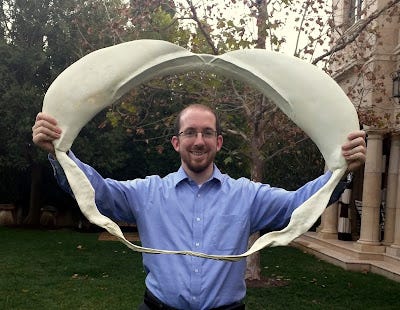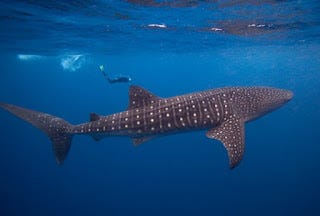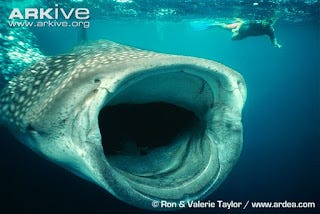My, What Little Teeth You Have!
Last week I acquired something extraordinary to add to the exhibits at The Biblical Museum of Natural History:

These are the jaws of the biggest fish in the world, the whale shark. Whale sharks can reach forty to fifty feet in length, with jaws five feet wide! This set, at only three-and-a-half feet wide, is from an immature specimen.

What are the theological ramifications, if any, of this leviathan? Well, there are a few interesting things to consider.
One: Could this be the fish that swallowed Jonah? Even the jaws of this juvenile specimen are more than big enough to swallow me whole. But surviving in the belly of a fish (or a whale) is not possible within the ordinary realm of nature. So it would either have been accomplished via supernatural means, or one can adopt the approach which was held by Rambam (according to some) and others that the story of the Jonah is not historical. (See Marc Shapiro's latest book for some fascinating discussion on how that view went down.)
Two: Is it kosher? No. It doesn't have scales.
Three: Is it the largest non-kosher fish? Not if we are using the biblical definition of fish. The largest non-kosher fish is the blue whale.
The fourth theologically-relevant (according to some) aspect of the whale shark, which will not be discussed at the museum, is the significance of its teeth.

The jaws of the whale shark contain over three thousand teeth. But they are really, really tiny; not even big enough to snag my clothing when I sawed the jaws in half to fit them in my duffel bag. The teeth certainly don't play in role in the whale shark's life. It swims with its mouth wide open, vacuuming in tiny plankton. It doesn't need teeth and it doesn't use them.
So why does it have them? Well, it makes sense if they are simply the vestigial remnants of the larger teeth that its ancestors possessed and which they used to eat fish and people at Amity Beach.
For some strange reason, many people find that religiously threatening. Others, however, see it as being a wonderful testimony to the creative wisdom used in the development of life:
[If evolution were to ever be accepted as scientific fact,] ...Judaism in that case would call upon its adherents to give even greater reverence than ever before to the one, sole God Who, in His boundless creative wisdom and eternal omnipotence, needed to bring into existence no more than one single, amorphous nucleus, and one single law of “adaptation and heredity” in order to bring forth, from what seemed chaos but was in fact a very definite order, the infinite variety of species we know today, each with its unique characteristics that sets it apart from all other creatures. (Rabbi Samson Raphael Hirsch, “The Educational Value of Judaism,” Collected Writings, vol. VII, p. 264)
Creating whale sharks and great white sharks and bamboo sharks and nurse sharks and lemon sharks and hammerhead sharks and goblin sharks and mako sharks is amazing. But creating one shark that becomes all these different sharks is even more amazing!



